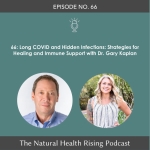Are Bioidentical Hormones for You?
As a family practitioner who specializes in women’s health, I often hear stories of frustration from my patients who are entering menopause. During menopause, a woman’s body dramatically decreases its production of estrogen, progesterone, and even testosterone. For many women, these hormonal changes can cause a range of symptoms including:
- Sleep disturbances
- Hot flashes
- Irritability
- Difficulty concentrating / brain fog
- Sporadic periods
- Difficulty regulating body temperature
- Fatigue
- Muscle aches
Although there is no single solution that works for every woman, hormone replacement therapy can relieve many of the unpleasant symptoms that most women experience during menopause.
When I explore the possibility of using hormone replacement with my patients, I make sure they understand both the benefits and the risks. Our discussions usually involve reviewing the latest medical research, but they always include evaluating each woman’s personal medical history, family history, and symptomatology.
This is what I tell my patients…
Hormone replacement is not risk-free. Years ago the Women’s Health Initiative (WHI) reported research results correlating the use of hormone replacement therapy with higher rates of breast cancer, strokes, and heart disease. These results were very disconcerting, but it is important for everyone to understand what the WHI did and did not study.
The WHI focused on studying the effect of two hormones: “conjugated equine estrogen,” a hormone extracted from the urine of pregnant mares and marketed as “Premarin,” and “progestin,” a synthetic version of progesterone, which is marketed as “Provera.” Both of these hormones are similar to, but not the same as, the hormones that women naturally produce. And both of the studied hormones produce metabolites as they pass through the liver, which in turn stimulate the production of proteins associated with heart disease, such as C-reactive protein, activating protein C, and clotting factors.
What the WHI did not investigate was the effect of treating menopausal women with “bioidentical” or “natural hormones”, the approach that I and many other physicians who specialize in women’s health take with patients.
Briefly described, a bioidentical hormone is one that has been synthesized from a botanical source, which, by itself or in combination with other hormones, mimics the body’s natural state. Although Premarin may be “naturally occurring” in the sense that it is biologically produced by a horse, it does not mimic the effects of a woman’s own hormones as closely as bioidentical hormones made from plant extracts.
A longitudinal study helped to further refine our understanding of the risks associated with hormone replacement therapy. Conducted by a group of French scientists and published in 2008 in the journal Breast Cancer Research and Treatment, the study evaluated more than 80,000 women who were taking hormone replacements. It concluded that the particular type of progesterone that a woman took with estrogen significantly affected her risk for breast cancer. Specifically, it showed that while Provera increased a woman’s risk for breast cancer, the bioidentical progesterone did not.
Questions? Give Us a Call!
So, what should we do with all this information?
Most importantly, how can we safely treat the symptoms of menopause that, at least for some women, can be so debilitating? To buffer the health impacts associated with lower estrogen levels, I often recommend the bioidentical hormone “Estradiol” because it most closely imitates the effect of estrogen on a woman’s body. A synthetic hormone made from soy and yam extracts, Estradiol can be administered by itself via transdermal patch or gel, or in combination with another bioidentical hormone, Estriol (a weaker estrogen), and used as a cream. The latter would be made at a compound pharmacy, while the patch or gel is available at most pharmacies. Bioidenticals can be taken orally, but I prefer to prescribe transdermals because this delivery method bypasses the liver, thereby allowing the hormones to be absorbed directly through the skin, into the bloodstream, and onto the target cells (e.g., the brain, skin, vagina).
Another approach to delivering bioidentical hormones is via subcutaneous pellet therapy. For those who don’t like patches or gels or who may have inconsistent results due to irregularities in absorption or possible skin irritation, pellet therapy is another safe and effective option. Hormone pellets are implanted in the fat layer under the skin (typically in the buttocks/hip area) and release an even and consistent dose of hormone over the course of several months, depending on the hormone. For those who are taking estrogen, pellets are administered every 3-4 months and every 5-6 months for patients taking testosterone.
If a woman still has her uterus, it is important that her hormone replacement include both estrogen and progesterone. This combination protects the uterus from unopposed estrogen, which can cause the lining of the uterus to grow too much (“endometrial hyperplasia”), a condition that can lead to uterine cancer. Even if a woman’s uterus has been removed, however, I usually recommend taking progesterone for its own health benefits, such as reducing irritability and sleep disturbances and improving cognition. I often prescribe the oral form of micronized progesterone called “Prometrium.” (Avoid this product if you have a peanut allergy!) I also prescribe a compounded progesterone cream that women can use transdermally. Both of these progesterone products are derived from yams. When low libido presents a problem, testosterone also can be added to the bioidentical hormone cream or gel.
Once a woman begins taking bioidentical hormones, we closely monitor her symptoms and retest her hormone levels as needed, adjusting her treatment accordingly. I always remind my patients that choosing hormone replacement therapy is never a lifetime commitment; it is always a choice, and at any time you can decide to wean off and utilize other methods to improve your well-being, such as herbal and nutritional remedies, acupuncture, meditation, and exercise. Furthermore, even when hormone therapy is an important part of feeling physically healthy and emotionally balanced, it is still just one piece. A woman’s activities, satisfaction with work, general health, relationships, nutrition, and exercise habits also will affect her overall sense of well-being.
If a woman chooses to go on hormone replacement, it is crucial that she continue to get her regular mammograms, pelvic exams, and pap smears. Annually, I meet with each patient to review her test results, and to discuss the latest medical literature on hormone replacement therapy. Then, in light of her particular health and life circumstances, we evaluate whether to continue treatment.
So, if you or a woman you love is in menopause and is suffering from any of the symptoms described above, please know that you have options, including bioidentical hormone replacement therapy. For more information or to schedule an appointment so we can help you evaluate the best course of treatment for you, please call us at 703-532-4892.
Our goal is to return you to optimal health as soon as possible. To schedule an appointment please call: 703-532-4892 x2We are here for you, and we want to help.
This article was originally published in May 2010. It was reviewed and updated in July 2023.









Leave a Reply
Want to join the discussion?Feel free to contribute!